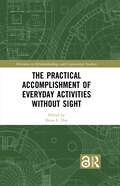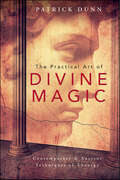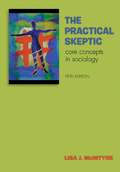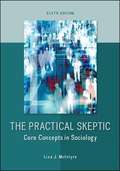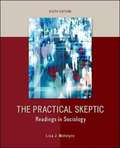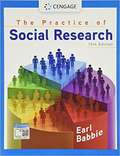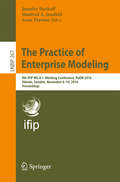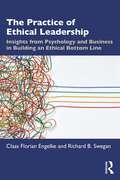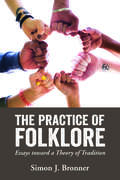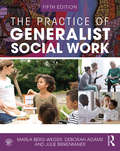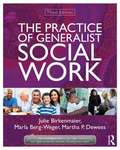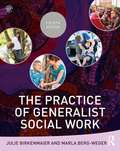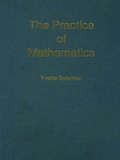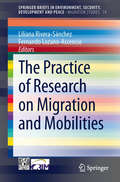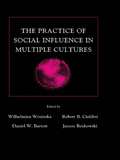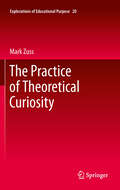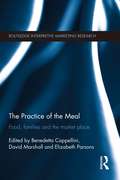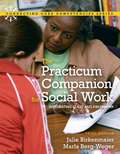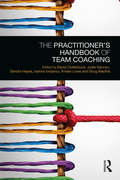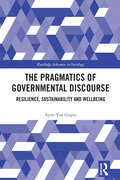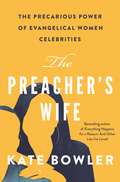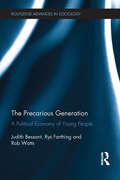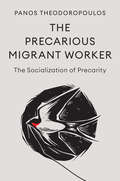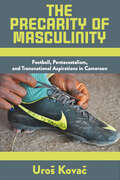- Table View
- List View
The Practical Accomplishment of Everyday Activities Without Sight (ISSN)
by Brian L. DueThis book is about the everyday life of people with visual impairment or blindness. Using video ethnographic methods and ethnomethodological conversation analysis, it unpacks the practical accomplishments of everyday activities such as navigating in public space, identifying objects and obstacles, being included in workplace activities, interacting with guide dogs, or interacting in museums or classes in school.Navigation, social inclusion, and the world of touch constitute key phenomena that are affected by visual impairment and which we study in this book. Whereas sighted people use their sight for navigating, for figuring out the location of co-participants and the embodied cues they produce, and for achieving understanding of objects in the world, visually impaired people on the contrary cannot rely on vision for navigating, for interpreting embodied cues, or for identifying or recognizing objects. Other sensory resources and other practices are employed to accomplish these basic human actions. The chapters in this book present examples and findings relevant to these issues and draw out the general theoretical implications of these findings. Whereas existing research often studies visual impairment from a medical, cognitive, and psychological perspective, this book provides insights into how visually impaired people accomplish ordinary activities in orderly, organized ways by a detailed study of their actions. While most books describe cognitive and biological issues, many of them using experimental methods, this book provides empirical findings about the actual daily lives as it naturally unfolds based on video recordings. The book contributes insights into the practices of living with visual impairment as well as perspectives for rethinking some of the most basic aspects of human sociality, including perception, interaction, multisensoriality and ocularcentrism (the view that the world is de facto designed by and for sighted persons). As such, the book provides novel findings in the field of ethnomethodological conversation analysis.Renewing the social model of disability, this book will appeal to scholars of sociology with interests in ethnomethodology and conversation analysis, the emergence of practical skills, and understandings of disability in terms of relations between the individual and the social environment.Chapter 1 of this book is freely available as a downloadable Open Access PDF at http://www.taylorfrancis.com under a Creative Commons [Attribution-Non Commercial-No Derivatives (CC-BY-NC-ND)] 4.0 license.
The Practical Art of Divine Magic: Contemporary & Ancient Techniques of Theurgy
by Patrick DunnThe ancient world of Egypt, Greece, and Rome was home to a set of magical and spiritual technologies, called theurgy, that unite the practice of magic with the aims of religion. Theurgy, or "godwork," is the art of creating a stronger bond between the theurgist and his or her deities. The results of this stronger bond were imminently practical: stronger magic, more meaningful existence, and a better life. With the fall of Rome, these techniques faded into obscurity, and many of them were lost forever.This book revives, restores, and reinvents these practices for a contemporary pagan or magical practitioner. A mixture of scholarly research and examination of source texts and daring experimentation and extrapolation leads to a complete and workable system that can inform a variety of practices, all presented in a relaxed, lighthearted, and readable way.Whether you practice witchcraft, ceremonial magic, or chaos magic, you can benefit from the practice of theurgy. You will learn techniques to create stronger bonds with divine forces, call up and communicate with spiritual beings, summon a magical assistant, create statues imbued with divine spirit, and master your own mind. The ultimate goal is union with the divine, but theurgy is a practical path, and every step on that path is designed to improve your life.
The Practical Skeptic: Core Concepts in Sociology (5th Edition)
by Lisa J. McintyreThe Practical Skeptic, a concise introduction to sociology, focuses on core concepts as the central building blocks for understanding sociology. Lisa McIntyre's straightforward, lively, even humorous style and her emphasis on critical thinking make this an engaging and user-friendly text for students of all levels. Through this conversational narrative, students are able to grasp key sociological concepts and learn the essential lesson that there is much that goes on in the social world that escapes the sociologically untrained eye.
The Practical Skeptic: Core Concepts in Sociology (Sixth Edition)
by Lisa J. McintyreThe Practical Skeptic, a concise introduction to sociology, focuses on core concepts as the central building blocks for understanding sociology.
The Practical Skeptic: Readings In Sociology
by Lisa McintyreThe Practical Skeptic: Readings in Sociology includes classic sociological research writings as well as recent pieces on fascinating topics of interest to students. It is the ideal companion to McIntyre's text, The Practical Skeptic: Core Concepts in Sociology, or other sociology texts. Readings in this edition challenge students to re-evaluate familiar social arenas: the college classroom, televised sports shows, restaurants, doctors' offices and even public restrooms. The readings focus around the essential message that there is much that goes on in the social world that escapes the sociologically untrained eye.
The Practice Of Social Research
by Earl R. BabbieKnown as the gold standard for research methods, Babbie's THE PRACTICE OF SOCIAL RESEARCH gives you a definitive guide to research as practiced by social scientists. Combining a straightforward approach with the author's renowned sense of humor, this student-friendly text equips you with the tools and knowledge to apply research concepts as both researcher and consumer. The author emphasizes the process by showing you how to design and construct projects, introducing today's various observation modes and answering critical questions about research methods, such as how to conduct online surveys and analyze both qualitative and quantitative data. The 15th Edition includes the latest General Social Survey findings along with new coverage of the global use of social research, the emerging role of big data, demographic analysis and more.
The Practice of Enterprise Modeling
by Anne Persson Manfred A. Jeusfeld Jennifer HorkoffEnterprise modeling (EM) has gained substantial popularity both in the academic community and among practitioners. A variety of EM methods, approaches, and tools are developed and offered on the market. In practice they are used for various p- poses such as business strategy development, process restructuring, as well as business and IT architecture alignment and governance. PoEM 2008, the First IFIP WG 8. 1 Working Conference on The Practice of Ent- prise Modeling, took place in Stockholm, Sweden. It is the first conference aiming to establish a dedicated forum where the use of EM in practice is addressed by bringing together researchers, users, and practitioners. The goals of PoEM 2008 were to - velop a better understanding of the practice of EM, to contribute to improved EM practice, as well as to share knowledge and experiences. The theme of PoEM 2008 was EM in different application contexts, e. g. , software development, including agile development, as well as business development, gove- ance, and change.
The Practice of Ethical Leadership: Insights from Psychology and Business in Building an Ethical Bottom Line
by Richard B. Swegan Claas Florian EngelkeThis book considers ethics as a practical discipline at the heart of decisions, reasoning, shaping, and ordering organizations. Both engaging and accessible, it offers effective suggestions for selecting and developing ethical leaders and invites readers to self-reflect and understand how to build ethical cultures within their organizations and beyond.Examining the many characteristics of ethical leadership, including love and authenticity, the book uses factual evidence to explore both its positive and negative characteristics. It offers readers an in-depth insight into how ethical decision making can help determine the right thing to do, supported by directly applicable ethical lessons that help leaders become more conscious going forward. The authors provide concrete suggestions for action, as well as ways to develop and understand what is needed to become an ethical leader. Each chapter encourages readers to reflect on their own experiences, as well as engage in discussion with others, and challenge basic assumptions. The book concludes by offering a long-term oriented outlook at future challenges for ethical leaders.Rooted in extensive psychological, philosophical, entrepreneurial, and business experience, The Practice of Ethical Leadership will appeal to leaders, human resource professionals, and Board members across a wide variety of organizations. This book will also benefit academics as well as anyone who is invested in the fields of leadership, management, business, and industrial-organizational Psychology.
The Practice of Folklore: Essays toward a Theory of Tradition
by Simon J. BronnerWinner of the 2020 Chicago Folklore PrizeCHOICE Outstanding Academic Title for 2020Despite predictions that commercial mass culture would displace customs of the past, traditions firmly abound, often characterized as folklore. In The Practice of Folklore: Essays toward a Theory of Tradition, author Simon J. Bronner works with theories of cultural practice to explain the social and psychological need for tradition in everyday life. Bronner proposes a distinctive “praxic” perspective that will answer the pressing philosophical as well as psychological question of why people enjoy repeating themselves. The significance of the keyword practice, he asserts, is the embodiment of a tension between repetition and variation in human behavior. Thinking with practice, particularly in a digital world, forces redefinitions of folklore and a reorientation toward interpreting everyday life. More than performance or enactment in social theory, practice connects localized culture with the vernacular idea that “this is the way we do things around here.” Practice refers to the way those things are analyzed as part of, rather than apart from, theory, thus inviting the study of studying. “The way we do things” invokes the social basis of “doing” in practice as cultural and instrumental. Building on previous studies of tradition in relation to creativity, Bronner presents an overview of practice theory and the ways it might be used in folklore and folklife studies. Demonstrating the application of this theory in folkloristic studies, Bronner offers four provocative case studies of psychocultural meanings that arise from traditional frames of action and address issues of our times: referring to the boogieman; connecting “wild child” beliefs to school shootings; deciphering the offensive chants of sports fans; and explicating male bravado in bawdy singing. Turning his analysis to the analysts of tradition, Bronner uses practice theory to evaluate the agenda of folklorists in shaping perceptions of tradition-centered “folk societies” such as the Amish. He further unpacks the culturally based rationale of public folklore programming. He interprets the evolving idea of folk museums in a digital world and assesses how the folklorists' terms and actions affect how people think about tradition.
The Practice of Generalist Social Work
by Marla Berg-Weger Julie Birkenmaier Deborah AdamsThe fifth edition of The Practice of Generalist Social Work expands its foundational and integrative coverage of social work values, ethics, competencies, and behaviors as they relate and function within diverse practice settings. Through a strengths-based perspective, students are given a comprehensive overview of the major skills and considerations for practice with individuals, families, groups, communities, and organizations, encompassing planned change, engagement, assessment, intervention, evaluation, termination, and follow-up. In response to the challenges and realities of professional practice, chapters in this new edition open with a case which is integrated to provide connections between the book’s content and real-life practice settings. Each chapter builds on the knowledge gained from previous chapters and provides expanded resources that contain up-to-date guidance for the beginning practitioner. These include: Consistent and in-depth use of key theoretical perspectives and case examples to demonstrate essential knowledge, values, and skills for generalist social work practice. Grand Challenges from the American Academy of Social Work and Social Welfare, which illustrate the connection between social work and the most significant contemporary challenges in our society. A clear focus on generalist social work practice, informed by the authors’ decades of real-world practice experience, at all levels of engagement and intervention. This edition also offers revised and expanded student and instructor resources, which are available at www.routledgesw.com, including new conceptually-based companion readings, access to six unique and interactive case simulations, quick guides for improved fieldwork, and annotated weblinks for further reading, listening, and viewing. Combining comprehensive and current resources in traditional and online formats, the new edition of The Practice of Generalist Social Work facilitates a dynamic, experiential introduction to social work.
The Practice of Generalist Social Work
by Marla Berg-Weger Julie Birkenmaier Martha P. DeweesThe new edition of The Practice of Generalist Social Work teaches and helps students apply the skills for micro, macro, and mezzo practice. The third edition contains over 80 pages of new content, including many skill-based guides to subjects such as cognitive behavioral therapy and motivational interviewing. Quick Guides, a new feature in the third edition, are tools that will be useful to students in everyday practice. Routledgesw.com now contains 6 cases; the authors have created a new case, Brickville, for this book. Within Brickville, students work with a mezzo case embedded within a macro case to help a family in a community facing gentrification. Instructor materials include extra readings; PowerPoints; test questions; annotated links; syllabi for one-, two- or three-semester courses; and EPAS guidelines. With 13 chapters and 6 cases, this book works with a one-, two-, or three-semester practice course. This book is also available in customized versions for your two- and three-semester courses (click the links below): Chapters 1-7: http://www.routledge.com/books/details/9780415731744/ Chapters 8-13: http://www.routledge.com/books/details/9780415731751/ Chapters 1-5: http://www.routledge.com/books/details/9780415731768/ Chapters 6-9: http://www.routledge.com/books/details/9780415731775/ Chapters 10-13: http://www.routledge.com/books/details/9780415731782/
The Practice of Generalist Social Work: Chapters 8-13 (New Directions In Social Work Ser.)
by Marla Berg-Weger Julie BirkenmaierThe fourth edition of The Practice of Generalist Social Work continues to teach students to apply micro, macro, and mezzo social work skills. This new edition strengthens the connection between the three levels of practice and is fully updated to the 2015 EPAS. This edition also contains more illustrations of theory and more context for deciding which type of intervention is a good fit. Most chapters now open with a case study and continually refer back to the case to provide additional connections between theory and real-life practice. Each chapter also incorporates a link to a Grand Challenge of Social Work from the American Academy of Social Work and Social Welfare, which shows the connection between social work and the most significant societal challenges of today. The Quick Guides within the text offer students guidance for their field experience and practice after graduation. The text also comes with a rich companion website that includes support materials and six unique cases that encourage students to learn by doing. Go to www.routledgesw.com to explore the cases and additional resources.
The Practice of Mathematics
by Yvette SolomonThe psychological description and explanation of how children learn to work with numbers is dominated by the theories of Piaget. Yvette Solomon suggests an alternative approach to the child's conception of number.
The Practice of Research on Migration and Mobilities
by Liliana Rivera-Sánchez Fernando Lozano-AscencioThe migration process is interpreted in a different way when researchers live in so-called societies of origin, than when it is interpreted from societies of destination--even when research work is multi-situated. The localization of researchers in this field involves numerous factors that influence the modalities for conducting research. Research agendas are clearly mediated by these localizations and this book on the contemporary social sciences points out those mediations, breaking with the dichotomous readings that are implicit in this migration process (origin-destination, north-south, and cause-effect, to mention just a few). In the individual chapters, priority is given to presenting the modalities through which research is conducted in multidisciplinary or interdisciplinary teams on the American Continent. In summary, the focus of this book is on the narrative of methodological experience of the Practice of Research on Migration and Mobilities.
The Practice of Social influence in Multiple Cultures (Applied Social Research Series)
by Robert B. Cialdini Daniel W. Barrett Wilhelmina Wosinska Janusz ReykowskiThis book provides a diverse collection of studies reporting the effects of social influence processes in multiple cultures at both the universal and culture-specific levels. The book is characterized by three distinct features. First, the social influence process is considered as a ubiquitous and pervasive feature of human interaction. Second, the book represents a multicultural approach which includes both cross-cultural and culture-focused examinations. Third, the book emphasizes practical implications of the research presented. This volume incorporates theory and research stemming from three different approaches to social influence: social influence principles across cultures, social influence and social change across cultures, and culture and moral perspective in the social influence process. Because each of these three parts encompasses a considerable variety of research methodologies, social contexts, and cultures, each is proceeded by an integrative commentary authored by one of the book editors. These essays provide syntheses of the topics and themes within the corresponding sections and within the book as a whole. They also offer critical commentaries on both theoretical and methodological issues, raise suggestions for future research, and focus on practical applications. This book is intended for both scholars interested in cross- and multicultural research into the mechanisms of the social influence process and for the professional whose mission is to make planned changes in a society. Knowledge about the influence process, especially regarding how it works in different cultures and within several cultural groups, facilitates this goal. The practical implications ending each chapter serve as encouraging instructions for such applications.
The Practice of Theoretical Curiosity
by Mark ZussThe desire for knowledge is an abiding facet of human experience and cultural development. This work documents curiosity as a sociohistorical force initiating research across the disciplines. Projects generated by theoretical curiosity are presented as historical and material practices emerging as expressions of embodied knowledge and experience. The shifting cultural, philosophical and practical relations between theory and curiosity are situated within classical, medieval, early modern and contemporary communities of practice. The Practice of Theoretical Curiosity advocates for a critical, aesthetic engagement in everyday life. Its purpose is to examine the pedagogical grounds and questions that motivate research programs in the sciences, education, technoculture and post-war social movements. Theoretical curiosity continually resists disciplinary limits. It is a core, embodied process uniting human pursuits of knowledge and power. This inquiry into inquiry itself offers an appreciation of the vital continuity between the senses, perception, and affect and concept development. It is informed by a critical reading of phenomenology as the embodied practice of researchers. This study sponsors a deepening of theory in practice and the practice of theoretical exploration. As a contribution to pedagogical practice, it offers a historical critique of the usually unquestioned philosophical, political and ethical grounds for educational, scientific and social research. The Practice of Theoretical Curiosity profiles significant alliances and persona as agents for the pursuit of novel and often controversial research, adventures and discovery. It claims that the place of technology and the technical is the primary channel for contemporary inquiry. The technosciences of genomics, artificial life and astrobiology are considered as contemporary extensions of a perennial desire to pursue and resist the limits of existing knowledge and representation.
The Practice of the Meal: Food, Families and the Market Place (Routledge Interpretive Marketing Research)
by David Marshall Elizabeth Parsons Benedetta CappelliniReflecting a growing interest in consumption practices, and particularly relating to food, this cross disciplinary volume brings together diverse perspectives on our (often taken for granted) domestic mealtimes. By unpacking the meal as a set of practices - acquisition, appropriation, appreciation and disposal - it shows the role of the market in such processes by looking at how consumers make sense of marketplace discourses, whether this is how brand discourses influence shopping habits, or how consumers interact with the various spaces of the market. Revealing food consumption through both material and symbolic aspects, and the role that marketplace institutions, discourses and places play in shaping, perpetuating or transforming them, this holistic approach reveals how consumer practices of ‘the meal’, and the attendant meaning-making processes which surround them, are shaped. This wide-ranging collection will be of great interest to a wide range of scholars interested in marketing, consumer behaviour and food studies, as well as the sociology of both families and food.
The Practicum Companion for Social Work: The Integrating Class and Fieldwork
by Marla Berg-Weger Julie BirkenmaierThe ideal companion for the first field/practicum experience, this text guides students through their placement while reinforcing the linkages between classroom learning, practice behaviors and competencies. It includes detailed information on the field/practicum experience from start to finish.
The Practitioner’s Handbook of Team Coaching
by David Clutterbuck Ioanna Iordanou Judie Gannon Sandra Hayes Krister Lowe Doug MacKieThe world’s challenges are becoming more and more complex and adapting to those challenges will increasingly come from teams of people innovating together. The Practitioner’s Handbook of Team Coaching provides a dedicated and systematic guide to some of the most fundamental issues concerning the practice of team coaching. It seeks to enhance practice through illustrating and exploring an array of contextual issues and complexities entrenched in it. The aim of the volume is to provide a comprehensive overview of the field and, furthermore, to enhance the understanding and practice of team coaching. To do so, the editorial team presents, synthesizes and integrates relevant theories, research and practices that comprise and undergird team coaching. This book is, therefore, an invaluable specialist tool for team coaches of all levels; from novice to seasoned practitioners. With team coaching assuming an even more prominent place in institutional and organizational contexts nowadays, the book is bound to become an indispensable resource for any coaching training course, as well as a continuing professional development tool. This book is essential reading for anyone with an interest in coaching, in both practice and educational settings. It will be of use not only for professional coaches, but also for leaders, managers, HR professionals, learners and educators, in the business, public, independent and voluntary sectors.
The Pragmatics of Governmental Discourse: Resilience, Sustainability and Wellbeing (Routledge Advances in Sociology)
by Ayan-Yue GuptaThis book presents a novel methodological framework for analysing governmental discourse. It involves combining pragmatist perspectives on language with computational sociolinguistics and large language models (LLMs).The first half discusses traditional critical approaches to investigating discursive practices, principally those employing Critical Discourse Analysis (CDA) and those based on methods developed by Michel Foucault. These are critiqued in terms of pragmatist views on meaning, which are rarely taken up in this area. It is argued that to understand the grounding of social structures and power relations in discourse, we must begin with a systematic account of how meaning is contextually fixed. It is proposed that a pragmatist reading of Foucault’s arguments about governmentality offers a productive framework for discourse analysis. To illustrate the advantages of this framework, the book presents a case study of the British government’s adoption of resilience, sustainability, and wellbeing discourses in the period 2000-2020. A dataset of 179 million tokens sampled from approximately 170,000 government documents is used to illustrate how this framework can be combined with natural language processing (NLP) to make robust inferences.This study will be of interest to both sociologists interested in language and in the methodological potential of recent developments in NLP. Importantly, the book demonstrates how LLMs can be harnessed to bring new perspectives to long-standing sociological questions.
The Preacher's Wife: The Precarious Power of Evangelical Women Celebrities
by Kate BowlerFrom the New York Times bestselling author of Everything Happens for a Reason: And Other Lies I've Loved, a fascinating look at the world of Christian women celebritiesSince the 1970s, an important new figure has appeared on the center stage of American evangelicalism—the celebrity preacher's wife. Although most evangelical traditions bar women from ordained ministry, many women have carved out unofficial positions of power in their husbands' spiritual empires or their own ministries. The biggest stars—such as Beth Moore, Joyce Meyer, and Victoria Osteen—write bestselling books, grab high ratings on Christian television, and even preach. In this engaging book, Kate Bowler, an acclaimed historian of religion and the author of the bestselling memoir Everything Happens for a Reason: And Other Lies I've Loved, offers a sympathetic and revealing portrait of megachurch women celebrities, showing how they must balance the demands of celebrity culture and conservative, male-dominated faiths.Whether standing alone or next to their husbands, the leading women of megaministry play many parts: the preacher, the homemaker, the talent, the counselor, and the beauty. Boxed in by the high expectations of modern Christian womanhood, they follow and occasionally subvert the visible and invisible rules that govern the lives of evangelical women, earning handsome rewards or incurring harsh penalties. They must be pretty, but not immodest; exemplary, but not fake; vulnerable to sin, but not deviant. And black celebrity preachers' wives carry a special burden of respectability. But despite their influence and wealth, these women are denied the most important symbol of spiritual power—the pulpit.The story of women who most often started off as somebody's wife and ended up as everyone's almost-pastor, The Preacher's Wife is a compelling account of women's search for spiritual authority in the age of celebrity.
The Precarious Generation: A Political Economy of Young People (Routledge Advances in Sociology)
by Rob Watts Judith Bessant Rys FarthingThis book draws on a wealth of evidence including young people’s own stories, to document how they are now faring in increasingly unequal societies like America, Britain, Australia, France and Spain. It points to systematic generational inequality as those born since 1980 become the first generation to have a lower standard of living than previous generations. While governments and experts typically explain this by referring to globalization, new technologies, or young people’s deficits, the authors of this book offer a new political economy of generations, which identifies the central role played by governments promoting neoliberal policies that exacerbate existing social inequalities based on age, ethnicity, gender and class. The book is a must read for social science students, human service workers and policy-makers and indeed for anyone interested in understanding the impact of government policy over the last 40 years on young people.
The Precarious Migrant Worker: The Socialization of Precarity
by Panos TheodoropoulosMigrant workers in the West are at the frontline of the precarious condition that is coming to dominate social and economic life in neoliberal societies. Yet despite the highly insecure and exploitative working conditions they routinely face, labour mobilizations by precarious workers are rare. In this immersive portrait of the daily realities of precarious migrant labour, Panos Theodoropoulos found work in Glasgow’s warehouses, factories and kitchens to uncover the ways that precarity is lived and contested. Connecting the realms of structure, subjectivity and culture, his analysis shows that precarity not only dictates workers’ labour conditions, but socializes them in an individualist, survival-oriented struggle that erodes solidarities and enforces its own neoliberal logic. Crucially, however, precarity and the wider neoliberal culture are unable to erase workers’ material awareness and experience of class injustice. This points to the possibility of forging strong connections and methods of resistance, firmly grounded in the lives and communities of precarious workers. Blending interviews, ethnographic notes and social theory, The Precarious Migrant Worker offers a unique glimpse into our increasingly precarious social reality and will be a valuable resource for scholars, students and activists interested in issues of migration, precarity and resistance.
The Precarity of Masculinity: Football, Pentecostalism, and Transnational Aspirations in Cameroon
by Uroš KovačSince the 1990s, an increasing number of young men in Cameroon have aspired to play football as a career and a strategy to migrate abroad. Migration through the sport promises fulfillment of masculine dreams of sports stardom, as well as opportunities to earn a living that have been hollowed out by the country’s long economic stalemate. The aspiring footballers are increasingly turning to Pentecostal Christianity, which allows them to challenge common tropes of young men as stubborn and promiscuous, while also offering a moral and bodily regime that promises success despite the odds. Yet the transnational sports market is tough and unpredictable: it demands disciplined young bodies and introduces new forms of uncertainty. This book unpacks young Cameroonians' football dreams, Pentecostal faith, obligations to provide, and desires to migrate to highlight the precarity of masculinity in structurally adjusted Africa and neoliberal capitalism.
The Precarity of Masculinity: Football, Pentecostalism, and Transnational Aspirations in Cameroon
by Uroš KovačSince the 1990s, an increasing number of young men in Cameroon have aspired to play football as a career and a strategy to migrate abroad. Migration through the sport promises fulfillment of masculine dreams of sports stardom, as well as opportunities to earn a living that have been hollowed out by the country’s long economic stalemate. The aspiring footballers are increasingly turning to Pentecostal Christianity, which allows them to challenge common tropes of young men as stubborn and promiscuous, while also offering a moral and bodily regime that promises success despite the odds. Yet the transnational sports market is tough and unpredictable: it demands disciplined young bodies and introduces new forms of uncertainty. This book unpacks young Cameroonians' football dreams, Pentecostal faith, obligations to provide, and desires to migrate to highlight the precarity of masculinity in structurally adjusted Africa and neoliberal capitalism.
